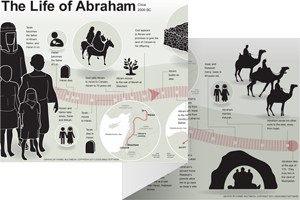21:1–7 Just as God promised in 17:16–21 and 18:10–14, Sarah conceives and bears a son. Abraham names him Isaac and circumcises him as God instructs (17:10–14). |
21:1 Yahweh visited Sarah God performs what He has promised—that Sarah will conceive by Abraham. This phrase will appear once more when Hannah bears her son Samuel—another child with a divine destiny (see 1 Sam 2:21).
21:2 the appointed time that God had told See 17:21; 18:10, 14.
21:3 Isaac See 17:19 and note.
21:4 Abraham circumcised Isaac his son Abraham observes the sign of the covenant (see 17:10 and note).
(see 17:10 and note).
eight days old See 17:12 and note.
21:5 one hundred years old Abraham was 75 years old when he originally responded to God’s call by leaving his home (12:4). Twenty-five years have passed since God promised Abraham that he would make him a great nation (12:2; compare 12:4).
21:6 laughter This is a wordplay on Isaac’s name. See 17:17 and note.
21:8–21 After the birth of Isaac, Sarah asks Abraham to banish Hagar and Ishmael, Abraham’s son with Hagar (v. 10). Abraham is reluctant, but God tells him that He will also make Ishmael a nation (vv. 11–13; compare 17:20). After Hagar and Ishmael leave, God provides for them and repeats to Hagar His promise to make Ishmael a great nation (vv. 15–21). |
21:8 was weaned The age that a child was weaned varied within ancient Near Eastern cultures.
21:9 the son of Hagar See 16:1–16 and note; note on 16:1.
21:10 will not be heir Sarah wants Ishmael and his mother to be exiled from the clan so that Isaac’s inheritance is not threatened. Genesis 16:5–6 shows that Sarah and Hagar did not have a good relationship prior to the birth of Isaac.
21:11 displeased Abraham very much Abraham is troubled by Sarah’s demand that Hagar and Ishmael be driven away, which means he recognized Ishmael as his legal son (16:15; 17:23, 25; 25:9, 12).
21:12 Listen to God tells Abraham to do what Sarah wants, assuring him that He will take care of Ishmael and produce a great nation from him.
21:14 he sent her away Abraham obeys God, sending Hagar and Ishmael away. The meager provisions may be a sign of Abraham’s trusting God with the fate of Hagar and Ishmael.
21:17 the angel of God called The interchange of God (who hears in this verse) and the Angel of God (who then speaks) shows a blurring of the distinction between the two—this is because the angel is speaking on behalf of God or is God in a form. Both of Abraham’s sons, Ishmael and Isaac, are saved by the angel calling from heaven (see 22:11).
 Old Testament Godhead Language
Old Testament Godhead Language
What is the matter The question may be a bit of a rebuke, since God previously told Hagar that her son would become a great nation (16:10–12). That promise is repeated in v. 18. Unlike Isaac, though, Ishmael is not promised territory, only a multitude of descendants.
21:20 God was with the boy God blessed Ishmael throughout his growth into manhood.
he became an expert with a bow The ot preserves a tradition that the descendants of Ishmael were expert marksmen (see Isa 21:17 for the warriors of Kedar; in Gen 25:13, Kedar is a son of Ishmael).
21:22–34 This section continues the narrative about Abraham’s relationship with the king of Gerar—Gerar is where Abraham is staying (see 20:1–18 and note). Abraham and the king make a covenant to deal honestly with each other (vv. 23–24). Abraham then confronts the king about his servants seizing a well (vv. 25–26). The two men then make a covenant agreeing that the well belongs to Abraham (vv. 27–32). |
 Ancient Near Eastern Covenant Parallels Table
Ancient Near Eastern Covenant Parallels Table
21:22 Abimelech See 20:2 and note.
21:23 swear to me here by God See Exod 6:8; Num 14:30; Deut 32:40; Ezek 20:23.
 Ancient Near Eastern Covenant Parallels Table
Ancient Near Eastern Covenant Parallels Table
21:24 I swear Promises were frequently formalized in the ancient Near East by oath-taking. This oath between Abraham and Abimelech was one of loyal friendship and nonaggression. See Gen 21:23 and note.
was one of loyal friendship and nonaggression. See Gen 21:23 and note.
21:28 seven ewe-lambs of These animals may have been sacrifices in a covenant ceremony (compare 15:9–17). However, they may have also been a reciprocation of Abimelech’s previous gift to Abraham in 20:14.
21:31 Beersheba This place name means either “well of the oath” or “well of seven.” There are seven lambs mentioned in v. 30 and the two men swear an oath there, as this verse indicates. Either meaning involves wordplay (compare v. 24).
21:32 the land of the Philistines Abimelech was king of Gerar (20:2). Gerar is here identified as being in the land of the Philistines (peleset in Hebrew). In the parallel story about Isaac and Abimelech, Abimelech resides in Gerar and is specifically called king of the Philistines (26:1)—however, Isaac may be encountering Abimelech’s son.
21:33 he planted a tamarisk tree A practice consistent with earlier commemorations of divine communication. See Gen 12:6.
the everlasting God The Hebrew phrase used here is el olam.

|
About Faithlife Study BibleFaithlife Study Bible (FSB) is your guide to the ancient world of the Old and New Testaments, with study notes and articles that draw from a wide range of academic research. FSB helps you learn how to think about interpretation methods and issues so that you can gain a deeper understanding of the text. |
| Copyright |
Copyright 2012 Logos Bible Software. |
| Support Info | fsb |
 Loading…
Loading…


